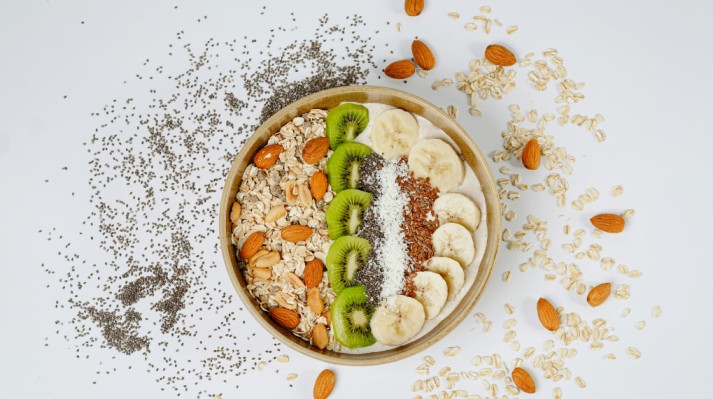A woman is thought to be in good hormonal and overall health if she has a regular menstrual cycle. A lot of people, on the other hand, find it quite annoying when their periods are not regular, whether they are late, missing, or too heavy. Stress, health problems (such as polycystic ovarian syndrome or thyroid problems), and lifestyle choices may all affect how regular your cycle is. However, nutrition is one of the most common things that people don’t pay attention to when it comes to cycle regularity.
Hormones play a big role in how our bodies control menstruation, and these hormones are closely linked to the nutrients we get from our food. Bad eating habits, not getting enough nutrients, and unbalanced meals can all upset this sensitive hormonal balance. Let us discuss through this article how food affects your menstrual cycle and what foods are best to eat to help you have regular, healthy periods naturally & effectively.
How Diet Affects Menstrual Health
There is a significant connection between diet and menstrual health, as diet can change everything from how regular cycles are to how bad symptoms are. A diet that is well-balanced and full of critical nutrients is good for making and controlling hormones, which are both crucial for keeping a healthy menstrual cycle. Eating too much sugar or salt, on the other hand, can make menstrual symptoms that are already present worse and throw off the cycle’s pattern.
Hormones and Nutrition
In order for hormones to be made and controlled properly, nutrients must be eaten. Hormone production needs vitamins and minerals as cofactors, while macronutrients like proteins, lipids, and carbs provide the energy and building blocks it needs. Dietary patterns and certain nutrients can significantly influence hormone balance, therefore affecting several biological activities.
- To make sure the endocrine system works right, you need to eat vitamins, minerals, and healthy fats.
- These nutrients help the body make hormones, keep them in check, and stay healthy overall.
- Healthy fats are important for making and using hormones, while vitamins and minerals are important for speeding up metabolic processes and making hormones.
A diet that is both well-balanced and rich in certain nutrients helps both the production and management of hormones. Poor eating habits, on the other hand, can make both of these processes less stable. Eating foods that are high in omega-3 fatty acids, vitamin D, and antioxidants will help keep your periods regular and stop frequent menstruation disorders.
Signs of Nutritional Imbalance in the Menstrual Cycle
Given are the signs of nutritional imbalance in the menstrual cycle. By making changes in your diet and making sure you are getting enough nutrients your body’s wants can cure the irregular periods
Irregular or Heavy Periods: Not consuming enough fat can make your periods irregular or heavy because lipids are needed to make estrogen and progesterone.
PMS Symptoms: Not getting enough complex carbs can cause anxiety, trouble sleeping, hair loss, constipation, missed periods, or weight reduction plateaus, all of which can be linked to PMS.
Fatigue: When you lose more iron during your period, you may feel tired because you don’t get enough iron and B vitamins.
Mood Swings: Hormonal imbalances and not getting enough nutrients might make you moody and mess up your sleep.
Hair Loss: Not getting enough nutrients, especially iron, might make you lose hair.
Menstrual Cramps: Not getting enough nutrients, especially vitamin D, can make period cramps and agony worse.
Weight Gain or Loss: Hormonal imbalances, which are commonly caused by what you eat, might make you gain or lose weight quickly.
Skin Changes: Changes in hormones can lead to skin issues, leading to acne or dark areas of skin (hyperpigmentation).
A lot of physical and mental problems can be caused by not getting enough nutrients or by having a nutritional deficiency. Some of the possible side effects of this illness are intentional weight loss, fatigue, muscle weakness, skin problems (like dry, inelastic skin or rashes), hair and nail problems (like brittle hair, hair loss, or brittle nails), and mood changes (like rage, apathy, or sorrow). Children may also show signs like slow growth, frequent infections, and slow wound healing.
Key Nutrients for Menstrual Regulation
Magnesium, iron, vitamin D, vitamin B6, and omega-3 fatty acids are some of the essential nutrients that are necessary for menstruation regulation. A healthy balance of hormones, a reduction in symptoms of premenstrual syndrome, and overall menstrual health are all benefits of nutrition.
Iron & Folate
If a woman’s menstruation is heavy or irregular, she needs these two nutrients:
Iron is necessary for making red blood cells and moving oxygen, which is very important during menstruation because blood loss happens then. Lentils, beans, lean red meat, and leafy greens are all great sources of these nutrients.
Folate is important for the reproductive system to work properly and may help keep ovulation regular. Beans, lentils, and green leafy vegetables are all great sources of this vitamin.
Omega-3 Fatty Acids
The symptoms of premenstrual syndrome (PMS) may be relieved or eliminated, and inflammation and cramping may be minimized. In addition, those symptoms may be eliminated. Flaxseeds, chia seeds, and fatty fish are all examples of foods that might be considered viable providers of this particular nutrient.
Vitamin B6 & Magnesium
Magnesium, which is well-known for its calming effects, can be of assistance in alleviating the cramping and muscle pain that are associated with menstruation. Almonds, pumpkin seeds, and leafy green vegetables are all excellent sources of this nutrient.
Period regulation and PMS symptom relief are two areas where vitamin B6 may be useful. It regulates hormones and affects neurotransmitters that control stress and mood, such as serotonin and dopamine.
The combination of these hormones helps to manage mood swings, minimize symptoms of premenstrual syndrome, and maintain a balance between estrogen and progesterone levels. Bananas, oats, chickpeas, pumpkin seeds, and dark chocolate are the food sources for these vitamins.
Zinc & Vitamin D
Vitamin D assists in the regulation of hormones and has the potential to alleviate symptoms of premenstrual syndrome. Exposure to sunlight, meals that have been fortified with vitamin D, and foods such as egg yolks, cheese, and fish are all potential sources of vitamin D.
Provides assistance in the production of hormones as well as the regulation of those hormones. Meat, shellfish, and pumpkin seeds are examples of foods that are rich in this amino acid. Pumpkin seeds are also a wonderful source of nutrients.
Fiber & Antioxidants
It is possible that foods that are high in fiber and antioxidants can play a significant role in the regulation of menstruation. These foods can help in the preservation of hormonal equilibrium and reduce inflammation, both of which are important factors in menstrual regulation. The consumption of these meals has the potential to reduce a variety of symptoms, including cramping and bloating, among others.
Antioxidants can be found in a variety of foods, including fruits, vegetables, legumes, nuts, seeds, and some spices like ginger and turmeric. Some examples of these foods include spices.
Best Foods for Irregular Periods
A healthy diet that includes plenty of fruits, veggies, whole grains, and lean meats will help with irregular periods. Flaxseeds, pineapple, and papaya are a few of the foods that may help control menstrual periods. To reduce premenstrual syndrome symptoms, limit your intake of coffee and sodium.
Leafy Greens and Cruciferous Vegetables
- It may have a role in period management due to its high nutrient content and likely effect on hormone balance.
- A healthy reproductive system requires the nutrients magnesium, iron, and folate.
- These nutrients can be found in leafy greens, such as kale and spinach. Some of the compounds contained in cruciferous vegetables, such as broccoli, cauliflower, and Brussels sprouts, like indole-3-carbinol, aid the liver’s function and hormone detoxification process.
Fruits High in Vitamin C and Fiber
- Fruits rich in vitamin C and fiber may help women whose cycles are difficult to predict.
- Fruits with a high vitamin C content include strawberries, kiwis, lemons, grapefruits, and oranges.
- Papayas can help with period management because they contain the unique enzyme papain.
- Bananas, apples, and pears are high-fiber fruits that help keep the digestive system healthy, which may affect period management.
Healthy Fats
- You may find that your menstrual period is easier to manage if you increase your intake of healthy fats.
- Fish, walnuts, and flaxseeds are high in omega-3 fatty acids, which may help reduce inflammation and ease period cramps and bloating due to their anti-inflammatory properties.
- Consumption of healthy fats is also essential for hormone production and ovulation.
Seeds and Nuts
- Particular seeds are consumed at different times.
- Adding seeds and nuts to one’s diet can be good for the management of irregular periods, particularly through a process that is known as “seed cycling.”
- This is especially true when it comes to the management of irregular periods.
- This entails taking specific seeds at different points of the menstrual cycle in order to potentially assist in the management of hormones.
Whole Grains and Legumes
- Incorporating legumes and whole grains into your diet can be beneficial when it comes to the regulation of menstrual periods to a certain extent.
- In addition to providing critical nutrients like B vitamins and minerals, these meals are abundant in fiber, which plays a role in the regulation of hormones.
- Fiber also plays a role in the regulation of hormones.
- These meals also include a significant amount of fiber in copious amounts.
- They contribute to the general preservation of reproductive health, which is a consequence of this.
Foods to Limit or Avoid
Reducing or eliminating processed foods, sugar, caffeine, alcohol, and saturated fats can help with irregular periods. These can make inflammation worse and throw off hormone balance, which can make period pains even worse. Listed below are the major food items you should avoid to maintain your periods.
Processed Foods: Fast food, sugary drinks, and snacks are high in unhealthy fats, sugar, and salt, which may increase inflammation and disrupt menstrual cycles.
Excessive Sugar: High blood sugar might affect hormone levels and worsen PMS symptoms.
Caffeine: Some caffeine is good, but too much, especially during menstruation, can increase anxiety, heart rate, and blood pressure, exacerbating PMS symptoms.
Alcohol: Dehydration from alcohol can cause bloating, headaches, and stomach troubles, which might worsen during menstruation.
Foods High in Saturated Fats: Saturated fats like butter, cream, and red meat might exacerbate inflammation and menstrual cramps.
Salty Foods: Water retention and bloating from high salt intake can make menstruation painful.
Spicy Foods: Spicy foods can irritate the stomach and increase digestive disorders, which may worsen menstruation abnormalities.
Sample 1-Day Meal Plan for Hormonal Health
Breakfast: Oats with flaxseeds, banana slices, and almond milk
Snack: Handful of mixed seeds (pumpkin, sesame, sunflower)
Lunch: Lentil and spinach curry with brown rice and steamed broccoli
Snack: Papaya cubes and a few walnuts
Dinner: Grilled tofu or salmon, quinoa, and sautéed greens
Hydration Tip: Herbal teas like ginger or spearmint, plus 2–3L of water daily
Lifestyle Tips to Support Menstrual Regularity
- Maintain a healthy body weight.
- Prioritize sleep (7–9 hours).
- Manage stress with yoga, meditation, or journaling.
- Avoid over-exercising or extreme dieting.
- Track your cycle to notice patterns and progress.
Cure Irregular Periods With A Healthy Diet And Lifestyle
Irregular periods are an indication that your body is striving to reach a better balance. You may help your body’s natural rhythm and hormone balance by making changes to your diet, lifestyle, and the right mix of nutrients that you can stick with.
At Qua Nutrition, we know that every woman looks different on the outside. Our personalized dietary plans are designed to help you find deficiencies, regulate your cycle, and improve your reproductive health. We can help you with premenstrual syndrome (PMS), polycystic ovarian syndrome (PCOS), or just want to feel more in sync with your cycle. Get a customized diet plan for irregular periods.









